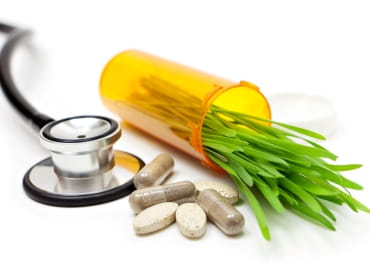Herbal Medicines and Orthopedic Surgery

The Bottom Line
Some herbal medicines and dietary supplements can affect blood clotting. This can complicate surgery and recovery if patients and doctors don't discuss ALL the medicines a patient is taking.

The Full Story
Some herbal medicines and dietary supplements can affect blood clotting. This can complicate surgery and recovery if patients and doctors don't discuss ALL the medicines a patient is taking. Complications can include:
- prolonged bleeding of the surgical wound;
- bleeding into a joint or muscle, leading to pain and infection;
- the need for blood transfusions.
Orthopedic surgeons operate on bones and joints. Many of their patients have painful arthritis and use herbal medicines and other alternative therapies. They may also be taking prescribed medicines that could interact with herbal medicines.
Two orthopedic surgeons recently published their review of herbal medicines that could cause bleeding, interact with anesthesia, or cause other problems if patients don’t stop them before surgery. These herbals include echinacea, feverfew, garlic, ginger, ginkgo, ginseng, saw palmetto, St. John's wort, and valerian. Other supplements that should be stopped prior to surgery include glucosamine, chondroitin, Sam-e (S-adenosylmethionine), and bromelain.
Doctors should ask patients about all of their medicines, including prescription medicines, non-prescription medicines, herbal medicines, home remedies, and other alternative therapies. Likewise, patients should provide a complete list of all of their medicines, therapies, and remedies. Some medicines and supplements must be discontinued as long as one to two weeks before surgery. Likewise, it may be a week or more before it is safe to resume taking these preparations after surgery.
For questions about the safe use of your medicines or possible health effects, call Poison Control at 1-800-222-1222. Took too much of an herbal medicine or dietary supplement? Use the webPOISONCONTROL® online tool, or call Poison Control.
Rose Ann Gould Soloway, RN, BSN, MSEd, DABAT emerita
Clinical Toxicologist
Poisoned?
Call 1-800-222-1222 or
Prevention Tips
Provide health care providers with the names and doses of all medicines, including herbal and botanical medicines.
This Really Happened
A 77-year-old woman was admitted to the hospital for a total hip replacement (THA). She was known to be taking only simple pain relievers and aspirin. After surgery, the wound had persistent blood and serum discharge. There was no infection present. Aspirin was stopped at 10 days. The discharge persisted for 3 weeks and the patient was readmitted to the hospital. The wound was still oozing and there was some fresh blood near the surface of the wound, but no specific bleeding vessel was identified. A relative of the patient then mentioned that she had been taking an herbal remedy to improve her mental alertness. This was found to be gingko biloba extract (GBE), 120 mg daily. After investigation revealed that GBE has anticoagulant (blood thinning) effects, it was discontinued. The wound continued to ooze but the drainage gradually decreased. Ten weeks after the THA, the surgical wound was dry.
Reference: Bebbington, A., Kulkarni, R., & Roberts, P. Gingko biloba: persistent bleeding after total hip arthroplasty caused by herbal self-medication. The Journal of Arthroplasty, 2005;20(1), 125-126.
For More Information
National Center for Complementary and Alternative Medicine of the National Institutes of HealthReferences
Rispler DT, Sara J. The impact of complementary and alternative treatment modalities on the care of orthopedic patients. J Am Acad Orthop Surg. 2011;19:634-643.Poisoned?
Call 1-800-222-1222 or
Prevention Tips
Provide health care providers with the names and doses of all medicines, including herbal and botanical medicines.
This Really Happened
A 77-year-old woman was admitted to the hospital for a total hip replacement (THA). She was known to be taking only simple pain relievers and aspirin. After surgery, the wound had persistent blood and serum discharge. There was no infection present. Aspirin was stopped at 10 days. The discharge persisted for 3 weeks and the patient was readmitted to the hospital. The wound was still oozing and there was some fresh blood near the surface of the wound, but no specific bleeding vessel was identified. A relative of the patient then mentioned that she had been taking an herbal remedy to improve her mental alertness. This was found to be gingko biloba extract (GBE), 120 mg daily. After investigation revealed that GBE has anticoagulant (blood thinning) effects, it was discontinued. The wound continued to ooze but the drainage gradually decreased. Ten weeks after the THA, the surgical wound was dry.
Reference: Bebbington, A., Kulkarni, R., & Roberts, P. Gingko biloba: persistent bleeding after total hip arthroplasty caused by herbal self-medication. The Journal of Arthroplasty, 2005;20(1), 125-126.
